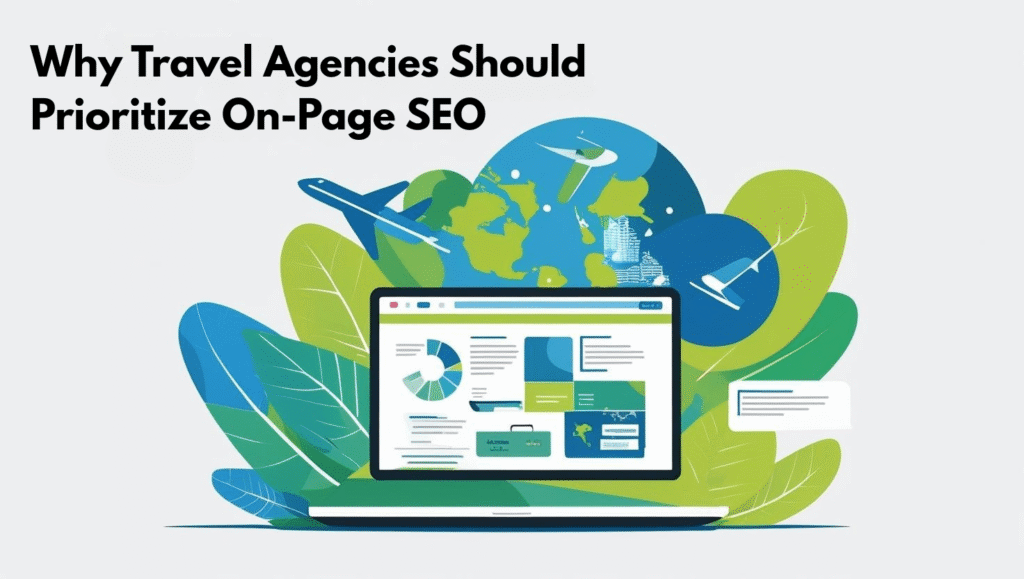Top 10 On-Page SEO Tips for Travel Agency Websites
Summary: On-page SEO plays a crucial role in helping travel agency websites rank better, attract relevant traffic, and convert visitors. Key strategies include optimizing page titles, using keyword-rich headings, creating clean URLs, adding schema markup, and improving mobile performance. Including engaging tour descriptions, reviews, and regularly updated blogs also boosts visibility. Structuring internal links and optimizing images further enhance user experience and search rankings.
Key Takeaways:
- Optimize meta titles and URLs to boost clicks.
- Utilise keyword-rich headings to enhance your search engine rankings.
- Add schema and links for better SERP visibility.
- Optimize images and speed for mobile-friendly performance.
- Maintain blogs and reviews to build trust and traffic.
Struggling to get your travel agency website noticed amidst thousands of competitors online? You’re not alone. With travelers increasingly relying on search engines to plan their trips, having a visually appealing website is no longer enough. If your pages aren’t optimized for search visibility, you’re missing out on high-intent leads every single day.
On-page SEO is the game-changer that ensures your stunning destination packages, travel guides, and blogs don’t go unseen. From optimizing titles to using the right keywords and structured content, smart SEO practices help travel agencies climb Google rankings, boost traffic, and convert curious visitors into paying customers. Ready to transform your website into a lead-generating engine? Let’s dive in.
Table of Contents
Toggle- Why On-Page SEO Matters for Travel Agencies
- A Snapshot of the Top 10 On-Page SEO Tips for Travel Websites
- Top 10 On-Page SEO Tips for Travel Agency Websites
- 1. Optimize Page Titles and Meta Descriptions
- 2. Use Keyword-Rich Headings and Subheadings
- 3. Create SEO-Friendly URLs
- 4. Include Internal Linking to Relevant Pages
- 5. Use High-Quality, Optimized Images
- 6. Add Schema Markup for Rich Snippets
- 7. Ensure Mobile-Friendliness and Fast Loading
- 8. Write Unique, Engaging Tour Descriptions
- 9. Add Testimonials and Reviews with SEO Considerations
- 10. Create and Maintain a Travel Blog
- How Agha DigiTech Helps Travel Agencies Rank Higher
- Final Thoughts
- Frequently Asked Questions (FAQ's)
Why On-Page SEO Matters for Travel Agencies

On-page SEO helps Google understand your website’s content and relevance, which is essential in the travel industry where competition is intense. People often search for travel destinations, packages, or agency reviews online, and showing up at the top of these searches can significantly increase your bookings. Good on-page SEO also enhances user experience—faster load times, mobile responsiveness, and structured content make users stay longer and trust your brand. Without it, even the most attractive travel offers might go unnoticed. Simply put, on-page SEO ensures your services reach the right audience at the right time.
A Snapshot of the Top 10 On-Page SEO Tips for Travel Websites
Want to boost your travel agency’s online visibility and attract high-intent travelers? Here’s a quick overview of the most impactful on-page SEO techniques you can implement today. This table summarizes each tip, how it should be used, and the specific impact it can have on your website’s performance and business growth.
SEO Tip | How to Use It | Impact on Business |
Optimize Page Titles and Meta Descriptions | Include destination keywords and unique selling points in meta data | Higher CTR and improved ranking in search results |
Use Keyword-Rich Headings and Subheadings | Structure pages with H1–H3 tags using primary and semantic keywords | Improves content readability and keyword relevance for crawlers |
Create SEO-Friendly URLs | Keep URLs short, readable, and keyword-optimized | Boosts user trust and improves indexation |
Include Internal Linking to Relevant Pages | Link to tour packages, blogs, or related destinations | Enhances site structure and boosts SEO authority flow |
Use High-Quality, Optimized Images | Compress images, use alt text and file naming with destination terms | Improves load speed and image search visibility |
Add Schema Markup for Rich Snippets | Implement schema for FAQs, reviews, and tours | Increases chance of showing enhanced listings in SERPs |
Ensure Mobile-Friendliness and Fast Loading | Use responsive design and tools like PageSpeed Insights | Reduces bounce rate and improves mobile ranking |
Write Unique, Engaging Tour Descriptions | Focus on storytelling with destination keywords | Increases time on site and improves conversion |
Add Testimonials and Reviews with SEO | Display user reviews with proper markup and fresh content | Builds trust and helps with local and organic SEO |
Create and Maintain a Travel Blog | Publish regular, value-rich content on destinations, tips, or travel news | Drives ongoing traffic and builds topical authority |
Now, let’s take a deeper look at each of these strategies and how you can apply them to your travel agency website.
Top 10 On-Page SEO Tips for Travel Agency Websites
Ready to boost your rankings and attract more travelers? Here are the top 10 on-page SEO techniques every travel agency should implement. These tips are practical, effective, and tailored for agencies looking to grow their digital footprint and increase leads organically.
1. Optimize Page Titles and Meta Descriptions
Your page title and meta description are the first things users see in search results. Use relevant keywords like “custom tour packages in [Destination]” or “affordable travel agency in [City]” in both. Keep titles under 60 characters and meta descriptions under 160. Make them compelling—include benefits, calls-to-action, or unique selling points. For example, a title like “Luxury Maldives Tours | Personalized Travel Packages” performs better than just “Maldives Tours”. Optimized metadata improves click-through rates (CTR) and signals relevance to search engines.
2. Use Keyword-Rich Headings and Subheadings
Headings (H1, H2, H3) help organize content for readers and search engines. Use keywords naturally within your headings to reinforce topic relevance. For example, instead of “Our Packages,” use “Affordable Europe Tour Packages for Families.” This provides clarity and improves SEO. Structure your page with one H1 (main title), followed by H2s and H3s for subtopics. Avoid stuffing keywords—focus on readability and intent.
3. Create SEO-Friendly URLs
Keep your URLs short, readable, and keyword-focused. Avoid numbers, unnecessary parameters, or random characters. Use hyphens to separate words and match the page’s focus. For example, use /thailand-group-tours instead of /page?id=123. Clean URLs help search engines understand page context and make your links more clickable when shared.
4. Include Internal Linking to Relevant Pages
Internal linking helps users navigate your site and distributes SEO value across pages. Link related pages such as destinations, blog posts, or service offerings using keyword-rich anchor text. This tells search engines how your content is connected and keeps visitors engaged longer.
5. Use High-Quality, Optimized Images
Visuals are crucial in the travel industry. Use high-resolution images that showcase destinations, but compress them to reduce load times. Add descriptive alt text with keywords (e.g., “Sunset over Santorini cliffs”) to improve accessibility and SEO. Use WebP format for faster loading, and always test image speed impact.
6. Add Schema Markup for Rich Snippets
Schema markup adds context to your content, enabling rich results like ratings, prices, or FAQs in search listings. For travel agencies, use schemas like Tourist Attraction, Review, Breadcrumb, and FAQ Page. This improves visibility and boosts CTR by enhancing how your page appears in SERPs.
7. Ensure Mobile-Friendliness and Fast Loading
Travelers often search on mobile while planning trips. Ensure your website is mobile-responsive, with clickable buttons, readable fonts, and no horizontal scrolling. Use tools like Google Page Speed Insights to fix speed issues such as large files or slow scripts. Faster websites reduce bounce rates and improve rankings.
8. Write Unique, Engaging Tour Descriptions
Avoid copying text from suppliers or generic listings. Write original, detailed descriptions that highlight what makes your tours special—local experiences, unique routes, or cultural insights. Include relevant keywords naturally and address customer questions. Engaging descriptions improve dwell time and signal quality to search engines.
9. Add Testimonials and Reviews with SEO Considerations
Reviews build trust and influence booking decisions. Feature customer testimonials on tour pages and mark them with review schema. Include keywords naturally in the review text if possible. Google values fresh, relevant user-generated content, and this can enhance your authority.
10. Create and Maintain a Travel Blog
Blogging helps capture long-tail keywords and build topical authority. Write about travel tips, destination guides, seasonal itineraries, and trending experiences. Use internal links to related services and optimize posts with images and schema. Consistent blogging shows Google your site is active and useful.
How Agha DigiTech Helps Travel Agencies Rank Higher
Travel agencies often face the challenge of standing out in a saturated digital space where large booking platforms dominate search results. Agha DigiTech helps you bridge that gap with customized on-page SEO strategies that attract the right audience and improve your organic rankings.
Our SEO experts focus on optimizing your website structure, metadata, URLs, and mobile performance, all aligned with how travelers search and make booking decisions. We also help you create keyword-rich content for destination pages and travel blogs that drive engagement and build topical authority.
By implementing schema markup, improving page load speed, and structuring internal links effectively, we ensure your site is both search engine-friendly and user-centric. Whether you’re promoting local tours or global packages, Agha DigiTech helps you rank higher, get discovered faster, and turn clicks into conversions. Our proven SEO solutions are tailored specifically for the travel industry to help you grow sustainably online.
Final Thoughts
In today’s digital world, on-page SEO is essential for travel agencies that want to grow online. By following the top 10 tips from optimising titles to building internal links and blogging, you can improve your visibility, attract more qualified leads, and increase conversions. SEO isn’t about tricking Google. It’s about creating content that’s useful, relevant, and accessible to your audience. Start with the basics and improve continually. And if you need expert help, Agha DigiTech is here to guide your SEO journey every step of the way.
Frequently Asked Questions (FAQ's)
How can I use headings effectively in travel content?
Use H1 for the main title and H2/H3 for sections and subtopics. Incorporate target keywords into headings naturally. Clear heading structure not only improves readability but also helps search engines understand your content hierarchy and relevance.
What tools can help with on-page SEO for travel sites?
Popular tools include Google Search Console, Semrush, Yoast SEO (for WordPress), Ahrefs, Screaming Frog, and PageSpeed Insights. These tools help monitor rankings, identify technical issues, suggest keyword opportunities, and ensure your pages are properly optimized.
Should I optimize every page on my travel website?
Yes, each page, whether it’s a tour listing, blog post, or contact page, should be individually optimized for relevant keywords, meta tags, images, and user experience. Consistent on-page SEO across all pages helps maximize your site’s overall performance.
Can blogging improve destination-specific SEO?
Definitely. Blogging about specific destinations, travel tips, and seasonal itineraries allows you to target long-tail keywords and trending search terms. This builds authority, keeps your site fresh, and attracts users at different stages of their travel planning journey.
What’s the difference between on-page and off-page SEO?
On-page SEO involves optimizing elements within your website, such as content, meta tags, images, and internal links. Off-page SEO includes external factors like backlinks, social signals, and brand mentions. Both are crucial, but on-page is foundational and directly controllable.





